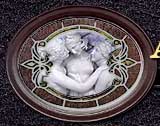Literary Commentary: John Milton's "On the Late Massacre in Piedmont"
1 Avenge O Lord thy slaughter'd Saints, whose bones
2 Lie scatter'd on the Alpine mountains cold,
3 Ev'n them who kept thy truth so pure of old
4 When all our Fathers worship't Stocks and Stones,
5 Forget not: in thy book record their groanes
6 Who were thy Sheep and in their antient Fold
7 Slayn by the bloody Piemontese that roll'd
8 Mother with Infant down the Rocks. Their moans
9 The Vales redoubl'd to the Hills, and they
10 To Heav'n. Their martyr'd blood and ashes sow
11 O're all th' Italian fields where still doth sway
12 The triple Tyrant: that from these may grow
13 A hunder'd-fold, who having learnt thy way
14 Early may fly the Babylonian wo.
Milton makes indirect allusions to Rome in his sonnet "On the Late Massacre in Piedmont," but does
not make his opinion hidden, or so subtle as to be missed. It is readily apparent exactly how
shocked and saddened he is by the bloody slaughter of the Waldensian sect in April 1655 at Pra del
Torno, and equally transparent what he thinks of the religious establishment that allowed or
commanded it to happen. To him, the victims were faithful dissenters who were the first to
correctly interpret God's will, while the marauders were representative of a greedy, tyrannical
Church who had lost its way - if it had ever followed it - and whose leadership was all too
subject to human frailties.
As this piece was so open and heartfelt, it led me to further research, about Milton himself but
also about the assault, the Waldensians themselves and the Catholic Church's official stance. It
was little wonder that the Waldensians were persecuted since their formation in the twelfth
century: they allowed the laity to preach (women included), viewed the Church as idolatrous and
untrue, and translated the Scriptures into the vernacular. They considered knowledge of Scripture
to be accessible to all, being opposed to the ordaining of priests by other priests. Such
teachings spread rapidly, and triggered the fury of Rome and the subsequent mass murder, which
did not stop with the hurling of mothers and infants over cliffs, but also entailed torture and
burning. It was not until 1997 that Rome recognized or apologized for the incident, which was all
too common of religious fervor throughout the past two millennia.
Milton's outrage mirrors my own doubts and disdain for overly zealous adherence to dogma and the
elevation of Scripture to near-divine status; cleaving too tightly to power and one's own view of
divinity leads never to enlightenment or to peace, but to violence and oppression. While Milton
calls for the Lord's own wrath to expose and avenge the wrongdoing, I call for acceptance of all
faiths and of no faith. Such acts must always be told - their cries echoing over the hills, and to
Heaven - for only by exposure and universal condemnation are such acts of hatred lessened and
eventually ceased.
As before, I chose what seems to be an older printing of the work, which is not terribly different
from the version printed in my Norton Anthology but maintains what might have been Milton's choices
of spelling and capitalization. What he chose to emphasize and contract makes clearer the poem's
meter; his anger is most heavily expressed by the use of trochaic feet to begin lines 7 ("Slayn
by the bloody Piemontese") and 8 ("Mother with Infant down the Rocks"). The first is to sharply
condemn, the second to appeal to emotion.
David Elsensohn, May 2005
Return to Essays
|

